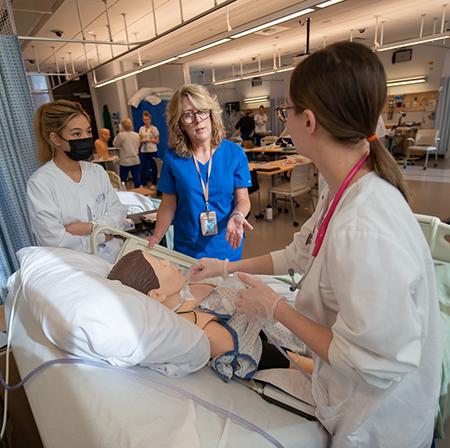Good Moral Character Required for Licensure
In compliance with policy of the Massachusetts State Board of Nursing, all applicants/students are informed that completion of the BS degree does not guarantee admittance to the registered nurse licensure examination. According to Board Licensure Policy 00-01, any individual convicted of a felony or misdemeanor conviction and/or who has been disciplined by a licensure/certification body must be evaluated by the Board to determine a licensure applicant’s compliance with the “good moral character” licensure requirement established at Massachusetts General Laws, Chapter 112, section 74 and 74A. Any individual who has been convicted of a felony or misdemeanor conviction, and/or who has been disciplined by a licensure/certification body, or whose ability to practice professional nursing is adversely affected by a physical or mental disability/illness that may endanger the health and/or safety of a person should seek special advising prior to enrolling in any professional nursing program in Massachusetts. Individuals convicted of certain criminal convictions are permanently excluded from nurse licensure in Massachusetts.
All students in the Nursing program will be required to have periodic Criminal Offender Record Information (CORI) checks requested by the department and/or clinical agencies. This background check is a computerized search to determine if an individual has any convictions, outstanding warrants or pending complaints. The information from these records is confidential and is destroyed when students graduate.
Progression and mandatory clinical placements in the Nursing program are contingent on a “no report” CORI check result. Clinical agencies may independently perform CORI checks on students and are not required to accept a student with a CORI report indicating that an offense exists.
The Nursing Department is not responsible for alternate clinical placements for students who cannot be placed in an agency related to a CORI offense report. Students have an obligation to inform the Nursing Department chair if any legal issues arise while in the program that are reportable on a CORI. Read more.
Health Care Agency Requirements: Health, Drug Screening and Other Requirements
Nursing students will be placed in a variety of health care settings. Each agency has requirements, which students must fulfill before they are allowed placement. This list may include, but is not limited to, the following; physical exam, immunizations, agency specific orientation, CORI, SORI, and drug screening.
This includes COVID-19 vaccination status. While Westfield State University may grant an approved college medical or religious exemption, clinical placement is determined by that agency's requirements. The student will be required to comply with any and all agency process. The clinical agency has sole authority in deciding whether to grant an exemption. Should the clinical agency deny the exemption, an alternate clinical placement might not be available and the student may not be placed for the semester.
Progression and mandatory clinical placements in the Nursing program are contingent on meeting all agency requirements. If a student is denied placement by an agency for any reason, including a positive drug or CORI report, the Nursing Department is not responsible for providing alternate clinical placements.
